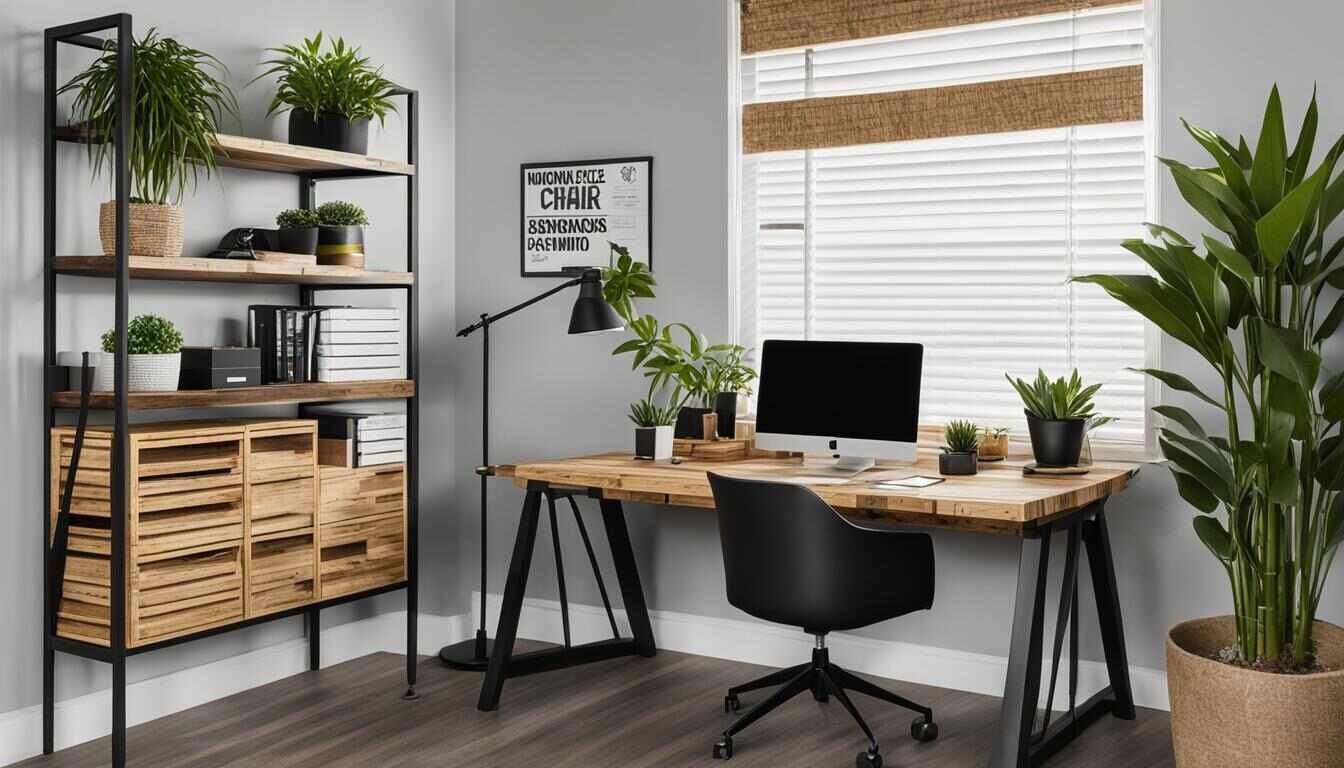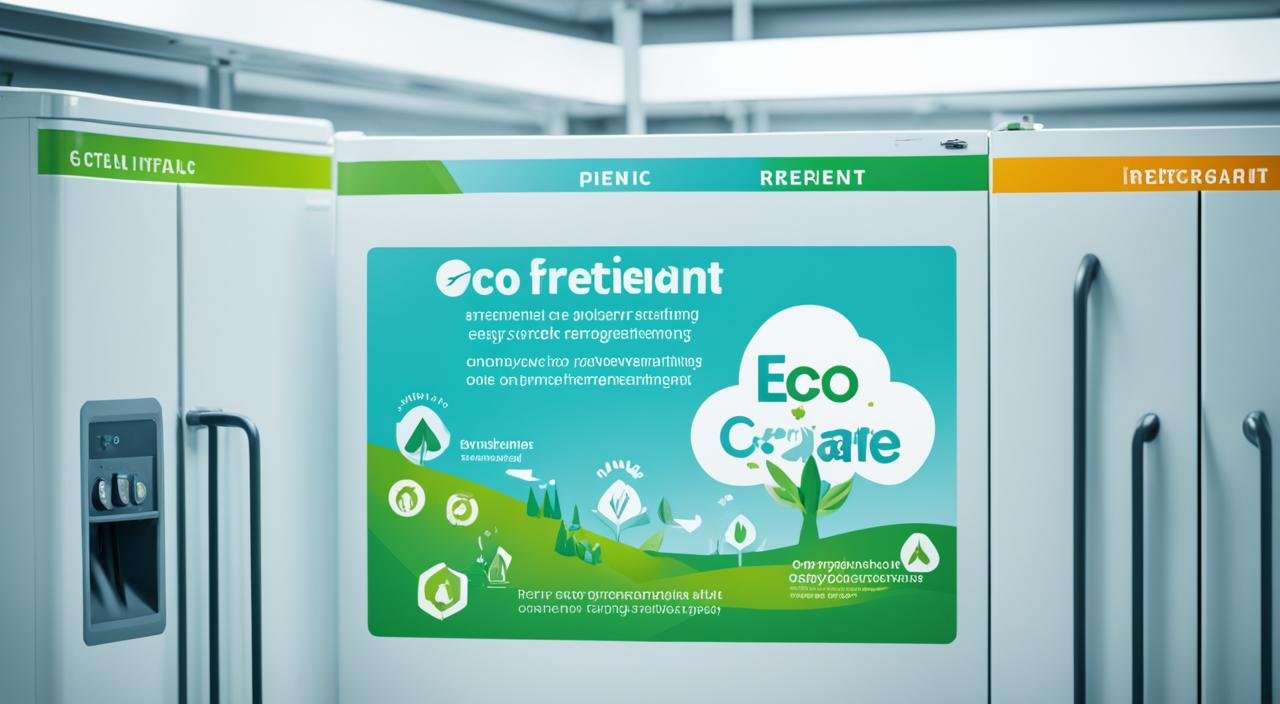In an increasingly environmentally conscious world, businesses are seeking to reduce their ecological footprint by creating eco-smart workspaces with sustainable office furniture. As a leader in the industry, we understand the importance of integrating green practices into office spaces.
When it comes to sustainable office solutions, everything from the design to the decor and space utilization can contribute to a more eco-conscious environment. By incorporating eco-friendly office furniture, businesses can not only reduce their environmental impact but also create a conducive and inspiring workplace for employees.
Key Takeaways:
- Creating an eco-friendly workspace starts with incorporating sustainable office furniture.
- Eco-conscious office furniture can reduce the ecological footprint of businesses.
- By choosing sustainable materials and designs, businesses can create a greener office space.
- Sustainable office furniture contributes to employee well-being and productivity.
- Eco-friendly office furniture is an investment in a sustainable future.
The Importance of Sustainable Practices for Businesses
In today’s world, businesses can no longer afford to ignore the significance of sustainable practices. Embracing eco-friendly initiatives not only benefits the environment but also brings about several advantages for businesses, including cost savings, improved brand image, and enhanced employee well-being.
By adopting sustainable practices, businesses can significantly reduce their environmental impact and contribute to a greener future. Implementing energy-efficient strategies, reducing waste generation, and choosing eco-friendly materials in operations and processes all play a crucial role in mitigating environmental harm. Not only do these practices help conserve natural resources, but they also contribute to cutting costs in the long run.
Investing in sustainable practices also enhances a business’s brand image and reputation. In today’s socially conscious market, consumers prioritize environmentally responsible businesses. By showcasing a commitment to sustainable practices, companies can attract eco-minded consumers, differentiate themselves from competitors, and build trust and loyalty with their target audience.
“Sustainable practices are not just good for the environment, but they also demonstrate a company’s dedication to being a responsible corporate citizen.”
Moreover, prioritizing sustainable practices positively impacts employee well-being. A sustainable work environment promotes a healthier and more productive workforce. By incorporating eco-friendly features such as natural lighting, adequate ventilation, and ergonomic office furniture, businesses can create a space that enhances the comfort and satisfaction of their employees.
Implementing sustainable practices is a collective effort that involves the entire organization. By involving employees in sustainability initiatives, businesses can foster a sense of ownership and pride, leading to increased employee engagement and morale. This, in turn, can contribute to higher productivity and improved overall performance.
As businesses face increasing pressure to reduce their environmental footprint, sustainable practices have become a necessity rather than a choice. By taking proactive steps towards sustainability, businesses not only protect the planet but also position themselves as industry leaders, reap financial benefits, and foster a positive work environment.
| Benefits of Sustainable Practices for Businesses |
|---|
| Cost savings through energy efficiency and waste reduction |
| Enhanced brand image and reputation |
| Better employee well-being and productivity |
Key Takeaways:
- Sustainable practices bring cost savings, improve brand image, and enhance employee well-being.
- Businesses can attract eco-conscious consumers by showcasing a commitment to sustainability.
- A sustainable work environment promotes employee health, satisfaction, and productivity.
By integrating sustainable practices into their operations, businesses can make a positive impact on the planet while reaping various benefits for their bottom line and workforce.
Choosing Sustainable Materials for Office Furniture
When it comes to creating eco-smart workspaces, choosing sustainable materials for office furniture is key. By using these materials, businesses can reduce their environmental impact and contribute to a greener future. There are various options available, including:
- Recycled plastics: Furniture made from recycled plastics helps minimize waste generation and promotes the reuse of materials.
- Organic materials: Opting for furniture made from organic and natural materials, such as bamboo or cork, promotes responsible sourcing and eliminates the use of harmful chemicals.
- FSC-certified wood: furniture made from wood certified by the Forest Stewardship Council (FSC) ensures responsible forestry practices and the preservation of natural resources.
Alongside sustainable materials, it’s essential to consider eco-friendly certifications. These certifications, such as FSC, Greenguard, or Cradle to Cradle, provide reassurance about responsible sourcing and production practices. They guarantee that the furniture meets certain environmental standards.
Additionally, choosing durable furniture contributes to waste reduction. Investing in high-quality, long-lasting pieces minimizes the need for frequent replacements and saves costs in the long run.
The Importance of Sustainable Material Selection
By researching and selecting sustainable materials for office furniture, businesses can actively participate in creating a more environmentally friendly workspace.
The right material selection not only reduces waste generation but also ensures that the furniture aligns with your eco-friendly goals. It demonstrates your commitment to responsible sourcing, production practices, and durability.
To further illustrate the importance of sustainable material selection, consider the following table:
| Material | Eco-Friendly Features |
|---|---|
| Recycled plastics | Reduces waste generation and promotes material reuse |
| Organic materials | Eliminates harmful chemicals and encourages responsible sourcing |
| FSC-Certified wood | Supports responsible forestry practices and preserves natural resources |
The table highlights the eco-friendly features of each material. By incorporating such sustainable materials into office furniture, businesses promote waste reduction and responsible practices.
Next, we will explore how prioritizing function and practicality in sustainable furniture can enhance the overall sustainability of workspaces.
Prioritizing Function and Practicality in Sustainable Furniture
When it comes to choosing sustainable office furniture, we understand that it’s not just about the materials and environmental impact. It’s equally important to prioritize the function and practicality of the furniture.
Investing in furniture that meets specific needs and complements the aesthetics and functionality of the office space can have a significant impact on reducing waste and minimizing environmental impact.
“By selecting sustainable office furniture that not only aligns with our eco-conscious values but also serves our everyday work requirements, we can create a truly sustainable and practical workspace.”
It’s essential to consider the functionality of the furniture and ensure that it suits the specific needs and requirements of the office. This includes considering factors such as storage capacity, ergonomic design, adaptability, and ease of use. Furniture that offers practical features like adjustable heights, built-in storage solutions, and modular designs can enhance productivity and overall employee well-being.
Furthermore, prioritizing the aesthetics of sustainable office furniture allows us to create a visually appealing workspace that reflects our commitment to sustainability. By selecting furniture with sleek designs, clean lines, and modern finishes, we can elevate the overall ambiance of the office while reducing our environmental footprint.
Materials that Balance Sustainability and Practicality
The choice of materials used in sustainable office furniture also plays a crucial role in balancing sustainability and practicality. Opting for durable, high-quality materials such as responsibly sourced wood, recycled plastics, and eco-friendly laminates ensures that the furniture lasts long and withstands everyday use.
Additionally, considering the durability and maintenance requirements of the materials is essential for practicality. Furniture that is easy to clean, resistant to stains and scratches, and requires minimal upkeep prolongs its lifespan and reduces the need for replacements, contributing to waste reduction and cost savings.
When assessing the environmental impact of the materials used, it’s important to consider factors such as the carbon footprint, energy consumption during production, and the recyclability of the materials. By opting for materials with lower environmental impact and higher recyclability rates, we can further minimize our ecological footprint.
| Material | Benefits | Considerations |
|---|---|---|
| Responsibly sourced wood | Durable, aesthetically pleasing, renewable material | Requires proper certification and responsible sourcing to ensure sustainability |
| Recycled plastics | Reduces waste and lowers the carbon footprint | May have limited color or finishEco-Friendly Elegance: Discover the Top Sustainable Office Furniture Trends of 2023! options |
| Eco-friendly laminates | Cost-effective, variety of designs and finishes | Requires proper disposal to avoid releasing harmful chemicals |
By carefully considering the function, practicality, and materials of sustainable office furniture, we can create a workspace that not only aligns with our environmental values but also enhances productivity and creates a pleasant work environment. It’s a win-win situation, benefiting both our business and the planet.
The Benefits of Modularity and Flexibility in Sustainable Office Furniture
Furniture that offers modularity and flexibility is essential for creating an eco-smart workspace. With the ever-evolving needs of businesses, adaptable office furniture allows for easy adjustments and reconfigurations, reducing the environmental impact caused by frequent furniture turnover. By choosing sustainable office furniture that can adapt to changing requirements, companies promote the responsible use of resources and contribute to a greener future.
Modular office furniture excels in its ability to optimize office layouts and space utilization. It allows for creative and efficient arrangements, promoting productivity and enhancing employee well-being. The flexibility of modular furniture enables the customization of workspaces, accommodating diverse work styles and preferences. This adaptability creates a harmonious and inclusive environment that fosters collaboration and innovation.
The efficiency of modular office furniture goes beyond its adaptability. Its design emphasizes functionality, ensuring that every piece serves a purpose. Modular workstations, storage units, and collaboration areas can be effortlessly integrated, maximizing the utilization of available space. This promotes a clutter-free and organized workplace, further enhancing efficiency and productivity.
Responsible use of resources is a core principle of sustainability. By investing in modular and flexible office furniture, businesses minimize waste generation. Instead of discarding and replacing furniture when it needs a change, modular setups allow for easy modifications and repurposing. This reduces the environmental impact associated with furniture production and conserves valuable resources.
When it comes to sustainable office furniture, modularity and flexibility are key attributes that align with the principles of eco-consciousness, space efficiency, and responsible resource utilization. By embracing adaptable furniture solutions, businesses can create work environments that are not only environmentally friendly but also promote collaboration, productivity, and employee well-being.
Expert Insight
“Modularity and flexibility in sustainable office furniture are essential for optimizing office layouts, space utilization, and employee well-being. It allows for easy adaptations to changing needs, promotes creativity and collaboration, and reduces waste generation. In today’s fast-paced world, adaptable furniture solutions are key to building eco-smart workspaces.”
Achieving Flexibility and Efficiency with Modular Furniture
To truly understand the benefits of modularity and flexibility in sustainable office furniture, let’s explore a comparison between traditional fixed furniture and modular furniture in terms of space utilization, adaptability, and environmental impact.
| Traditional Fixed Furniture | Modular Furniture | |
|---|---|---|
| Space Utilization | Restricted by fixed configurations, often resulting in unused or underutilized space. | Flexible arrangements optimize space, making the most of available square footage. |
| Adaptability | A rigid setup makes it difficult to accommodate changing office layouts and workflow needs. | Easily adjustable and reconfigurable, allowing for seamless adaptations as requirements evolve. |
| Environmental Impact | Higher waste generation as furniture becomes obsolete and needs replacement. | Reduced waste with the ability to modify, repurpose, and reuse furniture components. |
As seen in the comparison, modular furniture outperforms traditional fixed furniture in terms of space utilization, adaptability, and environmental impact. Embracing modularity and flexibility in sustainable office furniture is a wise investment that combines efficiency, responsible resource usage, and a greener future for businesses.
Supporting Sustainable Manufacturing Practices
Creating an eco-smart workspace goes beyond choosing sustainable office furniture; it also requires supporting manufacturers that prioritize sustainable practices. By partnering with brands like Haiken, known for their commitment to environmental responsibility and ethical sourcing, businesses can actively contribute to a more sustainable supply chain.
Haiken furniture exemplifies sustainable manufacturing practices through their use of eco-friendly production methods and high-quality, durable materials. From the sourcing of materials to the production process, Haiken focuses on minimizing their environmental impact while delivering exceptional furniture pieces.
“At Haiken, we believe that ethical and sustainable manufacturing is at the core of our responsibility to the environment. We continually strive to implement eco-friendly production methods and ensure our materials are responsibly sourced. By choosing Haiken furniture, businesses can be confident in their commitment to sustainability.”
Supporting sustainable manufacturing practices not only aligns with environmental responsibility but also promotes the use of eco-friendly production methods throughout the industry. By making conscious choices in the supply chain, businesses can inspire change and contribute to a greener future.
| Eco-Friendly Manufacturing Practices | Benefits |
|---|---|
| Eco-friendly production methods | Reduces carbon footprint and environmental impact |
| Responsibly sourced materials | Preserves natural resources and protects ecosystems |
| High-quality, durable materials | Long-lasting furniture that minimizes waste |
Choosing Haiken Furniture
Haiken’s commitment to sustainable manufacturing practices makes them an excellent choice for businesses seeking eco-friendly office furniture. Their range of high-quality, durable pieces, made from responsibly sourced and eco-friendly materials, ensures a stylish and sustainable workspace.
The table below highlights the key features of Haiken furniture:
| Features | Benefits |
|---|---|
| Eco-friendly materials | Reduces environmental impact |
| High-quality craftsmanship | Long-lasting furniture |
| Modern and stylish designs | Enhances office aesthetics |
The Benefits of Eco-Smart Workspaces for Businesses
Creating eco-smart workspaces with sustainable office furniture brings numerous benefits beyond environmental advantages. At our company, we understand the importance of cost savings, energy efficiency, brand image, employee well-being, non-toxic materials, ergonomic designs, productivity, and a commitment to a greener future. By choosing sustainable office furniture, businesses can reap these advantages and contribute to a more eco-conscious workplace.
Cost Savings and Energy Efficiency
Investing in sustainable office furniture can lead to significant cost savings for businesses. Energy-efficient designs, such as LED lighting and smart power management systems, reduce utility expenses. Additionally, eco-smart workspaces promote resource efficiency by minimizing waste and lowering operational costs in the long run.
Enhanced Brand Image
Creating an eco-friendly workplace demonstrates a company’s commitment to sustainability and responsible business practices. By choosing sustainable office furniture, businesses strengthen their brand image and appeal to eco-conscious customers and employees. This commitment to a greener future can attract top-tier talent and enhance the company’s reputation in the market.
Employee Well-Being
Non-toxic materials used in sustainable office furniture contribute to a healthier indoor environment. Employees are less exposed to harmful chemicals, improving their well-being and reducing the risk of health-related issues. Ergonomic designs further enhance the work environment, promoting comfort and reducing the potential for work-related injuries.
Improved Productivity
The right office environment has a direct impact on employee productivity. Sustainable office furniture considers both functionality and comfort, providing employees with the tools they need to perform at their best. Ergonomic chairs and adjustable desks promote better posture, reduce fatigue, and increase focus.
Choosing Haiken furniture for your eco-smart workspace ensures that you have access to high-quality, stylish, and sustainable office furniture. With an expert team dedicated to creating innovative and environmentally friendly designs, Haiken can provide you with furniture that meets your sustainability goals while enhancing the overall aesthetics of your workspace.
| Benefits of Eco-Smart Workspaces |
|---|
| Cost Savings |
| Energy Efficiency |
| Enhanced Brand Image |
| Employee Well-Being |
| Improved Productivity |
The Impact of Office Furniture on the Environment
Office furniture plays a significant role in our daily work lives, but it also has an undeniable impact on the environment. The production, use, and disposal of office furniture contribute to landfill waste and have far-reaching environmental consequences. As businesses worldwide strive to adopt sustainable practices, improving the sustainability of office furniture has become a key priority.
Each year, millions of tons of office furniture end up in landfills, adding to the growing problem of waste disposal. Traditional office furniture, often made with materials that are difficult to recycle, further exacerbates the issue. The disposal of these items contributes to the environmental burden of landfills and the depletion of natural resources.
“As a society, we have a responsibility to address the environmental impact of the products we use, including office furniture. It’s crucial that businesses make conscious decisions to reduce their ecological footprint and invest in more sustainable alternatives.”
However, the environmental impact of office furniture extends beyond landfill waste. The production of commercial furniture involves various processes that consume energy and resources, generating carbon emissions and contributing to climate change. Moreover, the sourcing and harvesting of timber for furniture production can lead to deforestation and habitat destruction.
To mitigate the environmental impact, businesses are increasingly adopting sustainability standards for office furniture. These standards encompass responsible sourcing, eco-friendly production methods, and the use of sustainable materials. By adhering to these standards, businesses can actively contribute to a greener future and minimize their ecological footprint.
The Role of Sustainable Materials
Choosing sustainable materials is key to reducing the environmental impact of office furniture. By opting for materials like recycled plastics, organic textiles, and FSC-certified wood, businesses can support responsible sourcing and production practices. These materials not only reduce the reliance on virgin resources but also promote the circular economy by diverting waste from landfills.
Additionally, durability is a crucial aspect of sustainable furniture. Investing in high-quality, long-lasting pieces reduces the need for frequent replacements, thus decreasing waste generation and conserving resources in the long run.
The Power of Sustainability Standards
Adhering to sustainability standards ensures that office furniture meets specific environmental criteria. Certifications like Greenguard, FSC, and Cradle-to-Cradle provide reassurance that furniture is produced with minimal environmental impact. These standards prioritize responsible manufacturing processes, low emissions, and the use of non-toxic materials, promoting a healthier and more sustainable work environment.
Improving the sustainability of office furniture is not only an environmental responsibility but also an opportunity to create healthier workspaces and align with the values of eco-conscious consumers.
The Three Key Aspects of Office Furniture Sustainability
When it comes to office furniture sustainability, there are three key aspects that businesses should consider: the materials and processes used, the life cycle and longevity of furniture, and recycling and end-of-life plans. By focusing on these areas, we can make a significant impact on reducing our environmental footprint and creating a more sustainable workplace.
The Importance of Sustainable Materials
Choosing sustainable materials for office furniture is essential to promoting eco-friendly practices. Opting for recycled plastics, organic materials, and FSC-certified wood helps reduce the demand for virgin resources and minimizes waste generation. Responsible sourcing and production practices, as indicated by eco-friendly certifications like FSC, Greenguard, or Cradle to Cradle, also contribute to the overall sustainability of the furniture.
Considering the Life Cycle and Longevity
Examining the life cycle and longevity of office furniture is crucial to evaluating its sustainability. Durable furniture that withstands regular use and maintains its quality over time not only reduces waste but also provides cost savings. Long-lasting furniture minimizes the need for frequent replacements, extending the product’s life cycle and reducing the environmental impact associated with manufacturing and disposal.
Implementing Recycling and End-of-Life Plans
Having proper recycling and end-of-life plans for office furniture ensures responsible disposal and the potential for materials to be repurposed or recycled. Designing furniture with recyclable components and exploring options for refurbishment or donation at the end of use can significantly reduce the amount of furniture sent to landfills. Implementing effective recycling programs supports circular economy principles and contributes to a more sustainable future.
The materials we choose, the lifespan of our furniture, and our commitment to recycling and responsible disposal play vital roles in office furniture sustainability. By prioritizing these aspects, we can create a greener and more environmentally conscious workplace.
It’s important to note that office furniture sustainability is a multifaceted endeavor that requires collaboration and ongoing commitment. By embracing sustainable materials, considering the life cycle and longevity of furniture, and implementing effective recycling and end-of-life plans, businesses can make a tangible difference in reducing their environmental impact and fostering a more sustainable future.
The Importance of Flexible Office Furniture for Sustainability
When it comes to creating sustainable workspaces, flexible office furniture plays a vital role. As businesses adapt to changing needs and evolving work environments, the ability to adjust and reconfigure office layouts becomes essential. By investing in flexible office furniture, companies can align their workplace design with eco-friendly practices while meeting the diverse needs of their employees.
One of the key advantages of flexible office furniture is improved workspace flexibility. With adjustable desks, modular workstations, and adaptable seating options, employees can easily customize their workspaces to suit their preferences and tasks. This not only enhances their comfort and well-being but also promotes productivity and creativity.
Additionally, flexible office furniture contributes to accessibility in the workplace. By providing adjustable-height desks and ergonomic chairs, businesses can create inclusive environments that cater to the diverse needs of their workforce. This fosters a culture of inclusivity and supports employees with physical disabilities or specific ergonomic requirements.
Furthermore, in today’s remote working landscape, a flexible office space is crucial for accommodating different work styles and encouraging co-worker interaction. When employees have the flexibility to choose where and how they work, they can create a balance between focused individual work and collaborative activities. This leads to increased engagement, stronger team dynamics, and more innovative ideas.
Ultimately, by embracing flexible office furniture, companies can create sustainable workplaces that prioritize employee needs, adapt to changing work environments, and foster co-worker interaction. It is a win-win solution that contributes to both environmental sustainability and employee satisfaction.
“Flexible office furniture allows employees to customize their workspaces, fostering a sense of ownership and empowerment. It also promotes collaboration and encourages movement throughout the day, resulting in a more dynamic and engaging work environment.”
At Haiken, we offer a wide range of flexible office furniture solutions designed to meet the evolving needs of modern workplaces. From height-adjustable desks and mobile workstations to versatile seating options, our eco-friendly furniture combines functionality, sustainability, and aesthetics to create inspiring workspaces.
Combine the benefits of flexible office furniture with sustainable materials and manufacturing practices, and businesses can truly make a positive impact on the environment while creating spaces that enhance productivity and employee well-being.
| Benefits of Flexible Office Furniture for Sustainability | Description |
|---|---|
| Improved Workspace Flexibility | Adjustable desks, modular workstations, and adaptable seating options enable employees to customize their workspaces, enhancing comfort and productivity. |
| Enhanced Accessibility | Flexible furniture, such as adjustable-height desks and ergonomic chairs, ensures an inclusive workplace that caters to diverse employee needs. |
| Promotes Co-worker Interaction | By allowing employees to choose where and how they work, flexible office furniture facilitates collaboration and strengthens team dynamics. |
The Role of Subscription Models in Sustainable Office Furniture
Office furniture subscription models offer a sustainable and economical option for furnishing workspaces. With these models, businesses can enjoy the benefits of customisation, flexible delivery, and adaptability to changing workspace needs while also prioritising sustainability requirements. By opting for an office furniture subscription model, companies can create an eco-friendly workplace that aligns with their values.
When it comes to customisation, office furniture subscription models provide businesses with the opportunity to choose from a wide range of options that suit their specific layout and design preferences. Whether it’s selecting the right desk, chair, or storage solution, the ability to customise allows for a cohesive and personalised workspace.
Flexible delivery is another advantage of office furniture subscription models. Instead of purchasing furniture outright, businesses can have it delivered and set up as needed. This flexibility is especially valuable for companies with changing office layouts or those transitioning to remote work arrangements. It ensures that furniture is not wasted or underutilised, contributing to a more sustainable approach.
Adaptability is essential in today’s dynamic work environments, and office furniture subscription models offer the perfect solution. With these models, businesses can easily modify their furniture arrangements to accommodate evolving needs. Whether it’s creating collaborative spaces, private work areas, or meeting rooms, the adaptability of subscription-based furniture allows companies to maximise their office layout for efficiency and productivity.
By incorporating sustainability requirements into their office furniture choices, businesses can contribute to a more eco-friendly workplace. Office furniture subscription models often prioritize sustainability, offering furniture made from eco-friendly materials such as recycled or responsibly sourced wood. These models also promote the reuse and recycling of furniture, reducing waste and extending the lifespan of office furnishings.
In summary, office furniture subscription models provide businesses with a sustainable and economically viable option for outfitting their workspaces. Customization, flexible delivery, adaptability, and sustainability requirements are key features that make these models an attractive choice for creating an eco-friendly workplace. By embracing office furniture subscription models, companies can take significant steps toward building a more sustainable and environmentally conscious office environment.
Conclusion
Creating eco-smart workspaces with sustainable office furniture is a responsible choice that benefits the environment, saves costs, and enhances employee well-being. By considering materials, functionality, modularity, and supporting sustainable manufacturing practices, businesses can create attractive and sustainable work environments.
Choosing sustainable materials like recycled plastics, organic materials, and FSC-certified wood ensures responsible sourcing and reduces waste generation. Prioritizing function and practicality in furniture selection not only minimizes environmental impact but also improves office efficiency. Modularity and flexibility offer adaptable and efficient space utilization, promoting productivity and employee well-being.
Supporting manufacturers committed to sustainable practices, such as Haiken, contributes to a greener future. Brands like Haiken offer high-quality, durable pieces made from eco-friendly materials, aligning with businesses’ sustainability goals. Additionally, incorporating flexible furniture and exploring subscription models further promotes an eco-friendly workplace.
By investing in sustainable office furniture and adopting eco-friendly practices, businesses can lead the way in creating a greener and more environmentally conscious workplace. Together, we can make a difference by building a sustainable future for our offices and the planet.
FAQ
Why should businesses prioritize sustainable practices for their office furniture?
Prioritizing sustainable practices for office furniture not only benefits the environment but also leads to cost savings, improved brand image, and enhanced employee well-being.
What should businesses consider when choosing sustainable materials for office furniture?
Businesses should consider researching sustainable materials such as recycled plastics, organic materials, and FSC-certified wood. They should also look for eco-friendly certifications like FSC, Greenguard, or Cradle to Cradle to ensure responsible sourcing and production practices.
What factors should be considered when choosing sustainable office furniture?
When choosing sustainable office furniture, it is important to consider not only the materials and environmental impact but also the function and practicality of the furniture. Investing in furniture that meets specific needs and complements the office’s aesthetics and functionality reduces waste and minimizes environmental impact.
Why are modularity and flexibility important in sustainable office furniture?
Modularity and flexibility are important in sustainable office furniture as they allow for easy adjustment to changing needs, reducing the environmental impact of furniture turnover. They also allow for creative and efficient space utilization, optimizing office layout for productivity and employee well-being.
Which manufacturers prioritize sustainable practices for office furniture?
Brands like Haiken are known for their commitment to environmental responsibility and ethical practices, offering high-quality, durable pieces made from eco-friendly materials. Choosing such manufacturers allows businesses to actively contribute to a more sustainable supply chain.
What are the benefits of creating eco-smart workspaces with sustainable office furniture?
Creating eco-smart workspaces with sustainable office furniture brings benefits beyond environmental advantages. Businesses can experience cost savings through reduced expenses and energy-efficient designs. Enhanced productivity and well-being result from non-toxic materials and ergonomic designs. Choosing Haiken furniture showcases a commitment to a greener future.
What is the environmental impact of office furniture?
Office furniture has a significant environmental impact, with millions of tons ending up in landfills each year. The production of commercial furniture also contributes to this waste. Thus, improving the sustainability of office furniture has become a priority for businesses worldwide.
What are the key aspects of office furniture sustainability?
Office furniture sustainability involves considering the materials and processes used, the life cycle and longevity of furniture, and recycling and end-of-life plans. Sustainability starts with responsible material selection and extends to considering the entire lifespan of office furniture.
What role does flexible office furniture play in sustainability?
Flexible office furniture plays a vital role in creating sustainable workspaces that adapt to changing needs. It improves workspace flexibility, employee comfort, and accessibility. With more people working remotely, a flexible office space is essential for accommodating different work styles and encouraging co-worker interaction.
How can office furniture subscription models contribute to sustainability?
Office furniture subscription models offer a sustainable and economical option for furnishing workspaces. These models allow for customization, flexible delivery, and adaptability to changing workspace needs. By considering sustainability requirements and using the subscription model, businesses can create an eco-friendly workplace.
How can businesses create eco-smart workspaces with sustainable office furniture?
Businesses can create eco-smart workspaces by considering materials, functionality, modularity, and supporting sustainable manufacturing practices. Flexible furniture and subscription models further contribute to an eco-friendly workplace.





